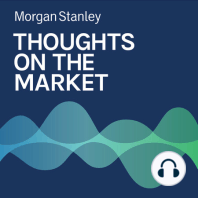4 min listen

U.S. Economy: The Next American Productivity Renaissance, Pt. 1
U.S. Economy: The Next American Productivity Renaissance, Pt. 1
ratings:
Length:
8 minutes
Released:
Mar 2, 2023
Format:
Podcast episode
Description
The COVID pandemic changed the way the U.S. engages with work, but how will these shifts impact structural changes to capital investment? Chief Cross-Asset Strategist Andrew Sheets and Chief Investment Officer for Wealth Management Lisa Shalett discuss.----- Transcript -----Andrew Sheets: Welcome to Thoughts on the Market. I'm Andrew Sheets, Chief Cross-Asset Strategist for Morgan Stanley Research. Lisa Shalett: And I'm Lisa Shalett, Chief Investment Officer for Morgan Stanley Wealth Management. Andrew Sheets: And on this special two-part episode, we'll be discussing what we see as the "Next American Productivity Renaissance". It's Thursday, March 2nd at 2 p.m. in London. Lisa Shalett: And it's 9 a.m. in New York. Andrew Sheets: So while everybody has been paying close attention, and rightly so, to 40 year highs of inflation that we've been having recently, there's another legacy from this pandemic that we want to dig into more deeply. We believe that the COVID crisis catalyzed an incredibly powerful regime shift, a once-in-a-generation shock to the labor markets which transformed the nature of work and is accelerating structural changes to capital investment. Lisa, you believe we're on the cusp of what you call the "Next American Productivity Renaissance", and this renaissance is underpinned by an upcoming capital spending supercycle. So, I guess the place to start is what does that mean and what's driving it? Lisa Shalett: I mean, I think that some of these trends were already beginning to take form before COVID struck, but COVID was really an accelerant. And so if we think about first the detachment from the labor force and the way COVID really transformed the way we think about work, and those jobs that maybe were not flexible to convert to a remote setting, or a work from home setting, and carried with them in-person high risk attributes. I think that was really one of the first dimensions of it, but then it was really about companies having to fundamentally rethink and re-engineer business models towards digitization, right? The removal of human contact. And then you overlay those two major pillars with things like decarbonization and the issues that emerged around how we make this transition to a cleaner energy mix around the world. Obviously COVID accelerated some of the issues around supply chain and deglobalization and how do we secure supply chains. And last but not least, I think it has really become clear we're talking about a world where incentives to invest either to substitute for labor, to strengthen our infrastructure, to commit to some of these climate change initiatives, to re-engineer supply chains or to deal with this new multipolar world. The incentives and the argument for capital spending has really changed. Andrew Sheets: So Lisa actually it's that last point on labor market tightness that I'd like to dive into a little bit more. Because I mean, it's fair to say that this would actually be a pretty normal cyclical phenomenon that as labor markets get tighter, as workers are harder to find, that companies decide that now it's worth investing more to make their existing workers more productive. Do you think that's a fair characterization of some past capital spending cycles that we've seen? And how do you think this one could fit into that pattern? Lisa Shalett [00:04:19] Yes, I think very often, you know, we've gone through these periods where the capital for labor substitution has been at the forefront. Now, one of the things that very often we have to wait for are what I call the supply side enablers of that. There have been eras where there's more automation-oriented technology that is available, and then there's eras where perhaps there's been less. And I think that one of the things that we're positing is that after the golden age of private equity that we're entering one of those periods of technology J-curve explosion, right, where the availability of automation-orienting technologies is there.
Released:
Mar 2, 2023
Format:
Podcast episode
Titles in the series (100)
Andrew Sheets: Fed to the Rescue? Maybe Not. by Thoughts on the Market